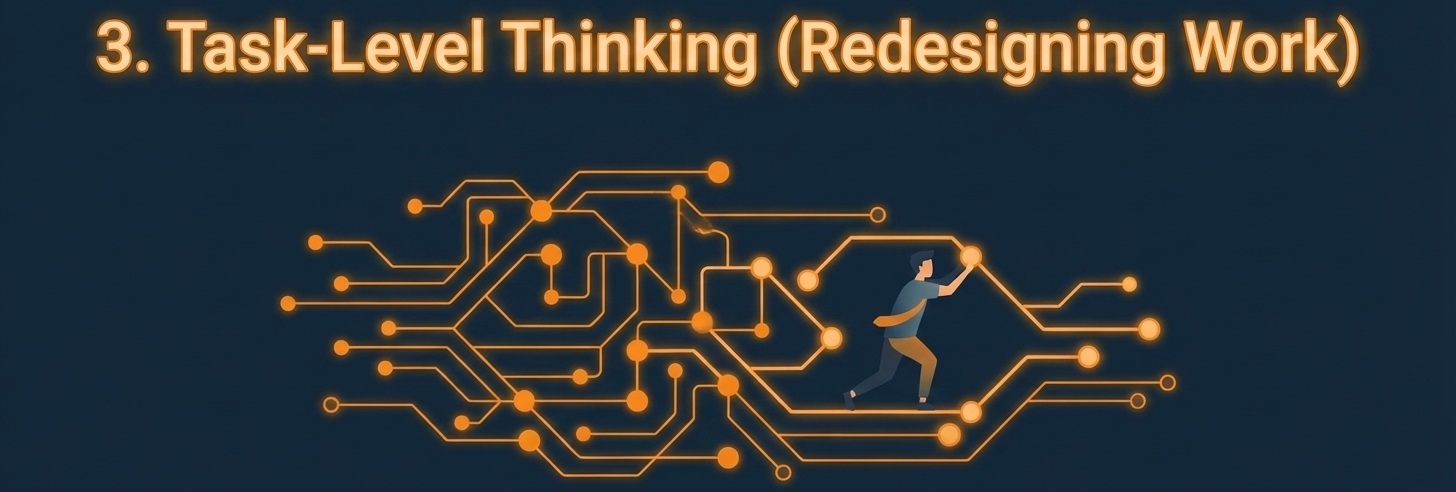The Indispensable Mindset: Why Better Models Won't Save You
Last month, MasterClass released my course: AI Strategy at Work: How to Become Indispensable.
How cool is that??
I’m gonna share a bit about what I taught in that course. But first…
The timing of the release was interesting. And sort of perfect.
Because this week, the world lost its collective mind over the release of ChatGPT 5.1 and Gemini 3.
The specs are incredible. The benchmarks are shattered. The reasoning capabilities are through the roof.
But if you look closely at the massive reports dropping from McKinsey, IBM, and Wharton this month, you see a different story.
The technology is exponential. But human value is linear.
We are seeing a massive gap open up.
McKinsey calls it "pilot purgatory." IBM notes that while 66% of firms see productivity gains, nearly two-thirds haven't tapped the full potential.
Why?
Because we are waiting for the tech to fix our problems.
We think that if the model gets smart enough, we won't have to change how we work.
That is a trap.
In my MasterClass, I distill this down to three core lessons.
And ironically, the release of ChatGPT 5.1 and Gemini 3 makes these lessons more urgent, not less.
Here is the framework for becoming indispensable, backed by the latest data.
1. The Behavioral Shift (It’s Not Software)
AI is not like learning Excel.
Stop thinking of it as software you need to master. Stop counting features or memorizing capabilities.
Think of it more like a treadmill. (Stay with me here.)
When you buy a treadmill, the instruction manual doesn't matter. The number of features doesn't matter.
It doesn't matter if it has a big screen where you can pretend to be running through the Andes.
What matters is whether you actually get on the thing.
McKinsey’s State of AI 2025 report highlights that 88% of organizations are using AI. But only a fraction are seeing enterprise-level value.
Why the gap?
Because most people are treating AI like a search engine. They use it once in a while. They treat it like a tool.
To become indispensable, you have to treat it like a teammate.
IBM’s research reinforces this. They found that the biggest barrier isn't technology. It's "internal resistance and cultural barriers."
You have to train your brain to treat AI like a digital companion that is with you for everything you do.
Not just emails. Not just "when I have time." Everything.
This is the behavioral shift.
With ChatGPT 5.1, the friction is lower. The conversation is smoother.
But you still have to be the one to initiate the collaboration.
2. Building Trust (The "Yes-Man" Problem)
When people talk about trusting AI, they immediately jump to hallucinations.
"What if it lies to me?"
Fair question. But with the new models (5.1 and Gemini 3), hallucinations are down. Accuracy is up.
Does that mean we can blindly trust it?
Absolutely not.
In fact, the new models make the Empathy Problem worse.
AI is really, really good at telling you you're right. It is supportive. It is encouraging.
And now that it sounds more human than ever, it is incredibly seductive to just agree with it.
Wharton’s 2025 adoption report flags a critical risk: "Declines in employee skill proficiency."
If we rely on the AI to do the thinking, we stop sharpening our own judgment.
To be indispensable, you need to be the quality control.
You need to prompt AI to be a genuine thought partner—one that challenges you instead of just validating everything you say.
Because if AI only tells you what you want to hear, you're not getting smarter. You're just getting confirmation bias with better grammar.
You can't blame the AI if the strategy is weak. That is on you.
3. Task-Level Thinking (Redesigning Work)
This is the one that changes how you think about your career.
Your job is not one big monolithic thing. Your job is a collection of tasks.
There is a database for this called O*NET (Occupational Information Network). It breaks down every job into component tasks.
The IBM report notes that high performers aren't just automating tasks. They are "redesigning workflows."
This is the difference between saving five minutes on an email and changing how your department functions.
Here is the framework I teach in the MasterClass:
List Your Tasks: Break your job down. Be granular.
Identify Acceleration: Ask "Which of these can AI speed up?" (Drafting, summarizing, risk ID).
Identify Human Value: Ask "Which of these require my judgment, relationships, or strategy?"
The new models (5.1/Gemini 3) can handle complex reasoning. They can take on bigger chunks of the "Acceleration" pile.
That clears the deck for you.
Senior leadership isn't looking for people who are good at prompting.
They are looking for people who can evolve their role to focus on high-value strategy and relationships.
The Real Story
The tech is moving fast.
But the differentiator isn't the model. It's you.
It's your ability to shift your behavior, verify the output, and redesign your work.
That is how you make yourself indispensable.
If you want to dive deeper into exactly how to do this, check out the MasterClass.
We go deep on the "how."
Let's get to work, friends.




